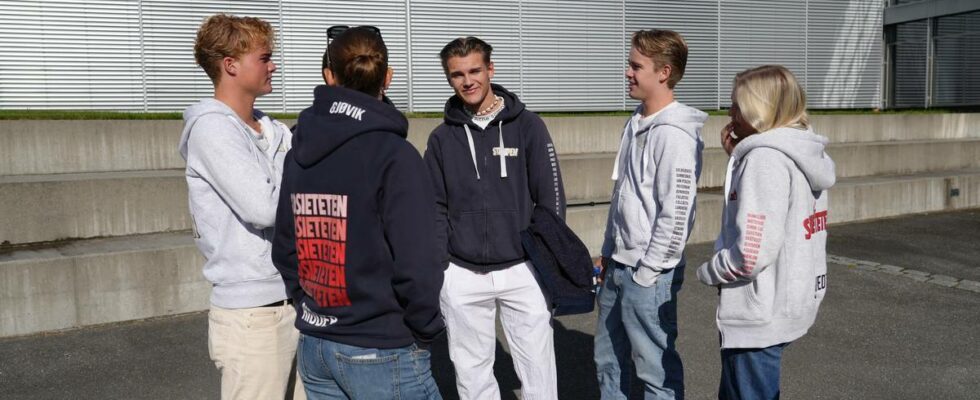Just before the summer, the county politicians in Innlandet adopted a new rule of law to prevent exclusion. The decision means that it is forbidden to wear symbols and effects that mark that you are part of a group or a gang. Like Russian sweaters with logo. Rikke Skatvedt Engen arrived on the first day of school in third grade at Gjøvik secondary school in a gray sweater with the name “Sosieteten” on the back. She is part of a Russian group of 20 people. – I understand that people can think that it is a reminder that you are not in a gang, but there are quite a lot of other things you can start with before those sweaters here, we all think, says Skatvedt Engen. Photo: Roar Andre Berntsen / news Measures against exclusion during the Russian holiday County mayor Thomas Breen (Ap) made no secret of the fact that it was precisely the Russian holiday that he wanted to limit with the decision that came in June. – We have seen a development over many years where actually everyone thinks that the Russian celebration is not good. This is the first step in the direction we intend to go for Innlandet County Municipality. That is why we are the first in Norway to regulate, he told news in June. No other county than Innlandet has so far determined such rules. Does not feel heard by the politicians The ban led to protests from many students. The pupils thought they had not been consulted. That the ban was too intrusive and that it would also not be effective in preventing exclusion. A signature campaign was started to reverse the decision. In a short time they collected over 2,000 signatures. Rikke Skatvedt Engen på Gjøvik does not disagree that exclusion is a problem. But she thinks this is not the way to go. She thinks they should have been asked before the ban was passed. That is why she participated in the protest. – When I’ve sent a lot of emails and called several times and haven’t received an answer, you get really like that; but it doesn’t apply to you who sit at the top, it applies to us who will go to that school, she says. Emil Benonisen Eriksen and Jakob Ptacek say they have been part of a group of friends since primary school. During the Russet era, they formed the group “Stampen”, with matching sweaters, which they would like to join. Photo: Knut Erik Røsrud / news Jakob Ptacek and Emil Benonisen Eriksen have been friends since primary school and are in the group “Stampen”. They had also worn uniforms at school today, which they admit was in protest. They think it can seem more exclusive to wear expensive branded sweaters than a Russian sweater. – I don’t think it’s that much worse to go with a “stampen-zip” than to go with a gant-zip that costs NOK 2,000. Then it’s almost more exclusionary that people wear expensive clothes and gain status through it, says Emil Benonisen Eriksen. The Russian group “Stampen” says there are several other things that can be done to improve inclusion. They suggest class trips and other social measures. Photo: Knut Erik Røsrud / news But there were more people than the Russians who reacted to the politician’s decision. Law professor Hans Fredrik Marthinussen at the University of Bergen believes the ban is not legal at all. Don’t know how they will enforce the ban The young people say they expect to get notices at school today, for defying the adopted ban. news has spoken to a number of headmasters in Innlandet, who say they are currently unsure of how they will enforce this rule. Bjørn Madsson is headmaster at Gjøvik secondary school. He says he wants to talk to the students who came in Russian sweaters today. But there will probably be no comments after today’s protest, as the young people feared. The headmaster, Bjørn Matsson, says they have had good cooperation with Russia in recent years. – It has been the Russian government for many years that has had a great focus on inclusion. And then we know that there are many pupils who are aware of extraneousness linked to Russian time, says the headmaster. Photo: Roar Andre Berntsen / news – It says that the purpose should be to prevent exclusion, and I cannot claim that everything is exclusionary today. So here we have to enter into a dialogue with the pupils, he says. The ban came right at the end of the previous school year. According to Madison, it is unclear how they will enforce this. – We think that here is someone who has had very good intentions, and then it is demanding to follow that up in practice. Here we have few concrete answers for now. I think perhaps we need dialogue with the regulators here as well, on what they want. According to what news knows, the rectors in the county will have a meeting early in September, where this will be a topic. news has contacted Udir about what they think about the ban and how the schools should enforce this. They haven’t replied yet. Published 19.08.2024, at 11.49 Updated 19.08.2024, at 11.55
ttn-69
Pupils showed up in Russian clothes to protest against the symbol ban that has been adopted in Innlandet – news Innlandet – Local news, TV and radio

